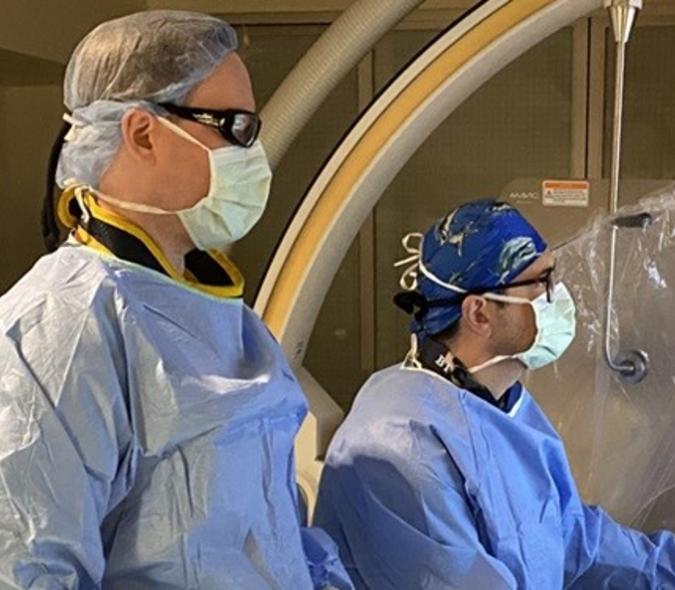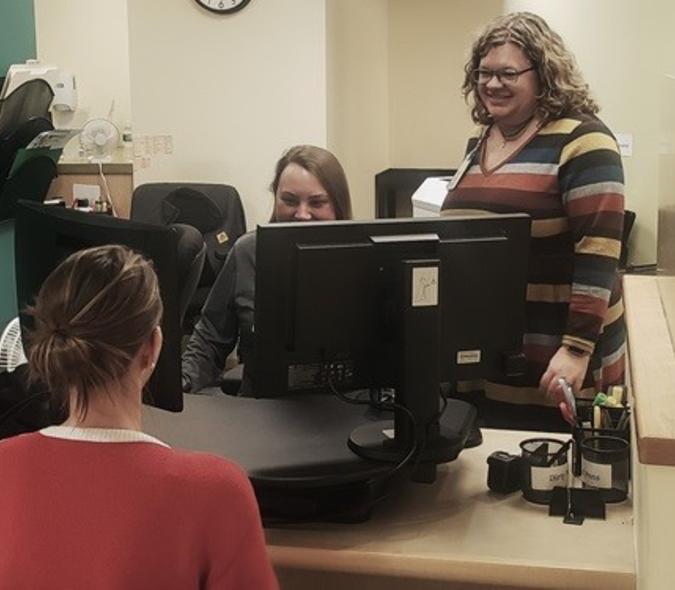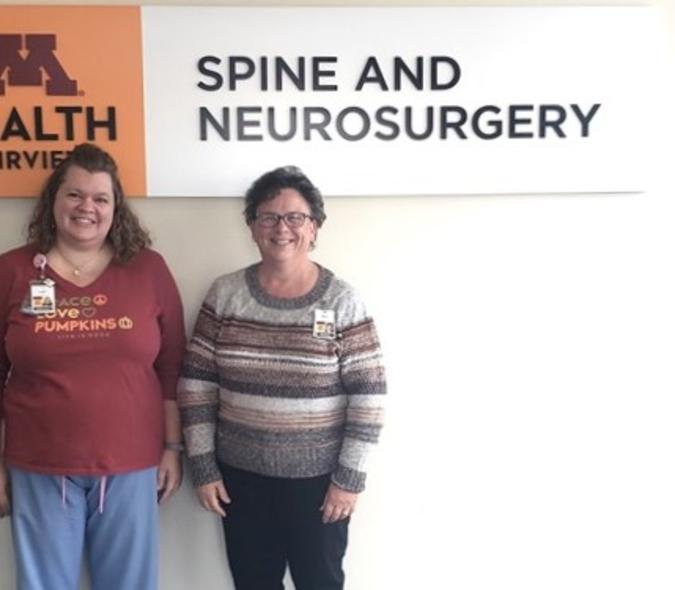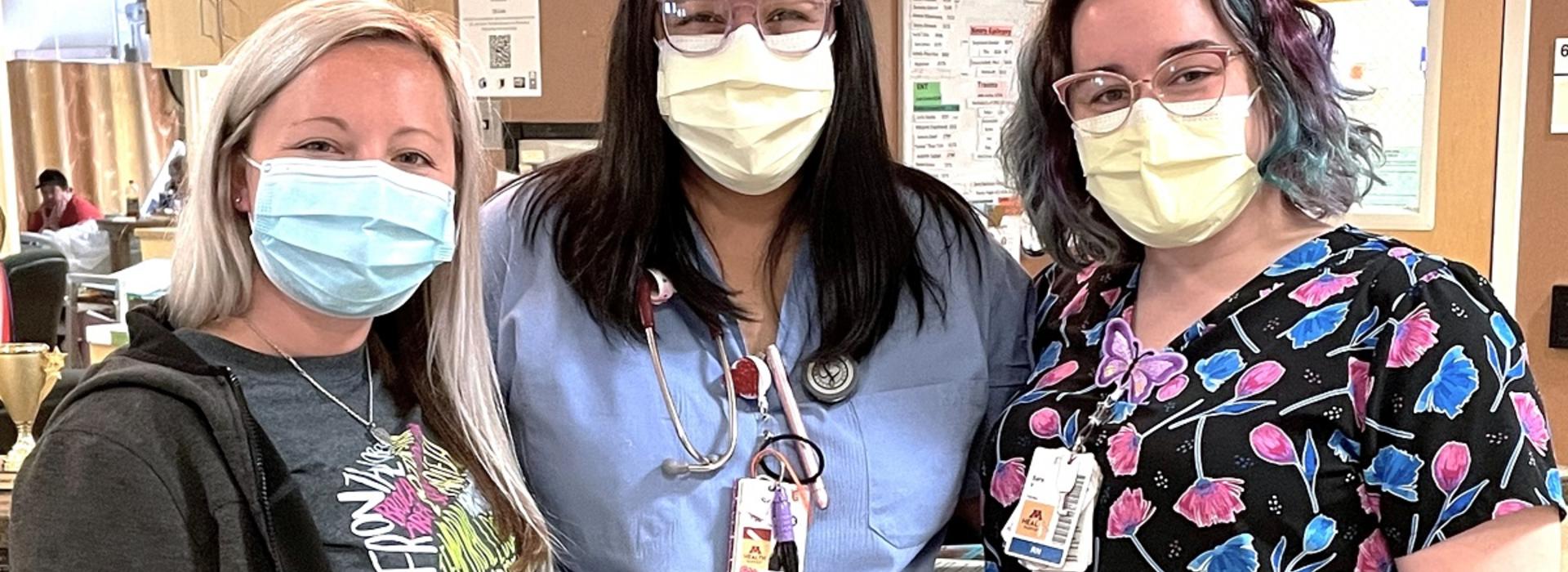
Neuroscience nursing: challenging, rewarding, exciting
Each year during the third week of May, we celebrate neuroscience nurses. The American Association of Neuroscience Nurses, who sponsors the celebration, notes, “As a neuroscience nurse, you work hard throughout the year by dedicating yourself to caring for the most vulnerable patients and families. This special week is about recognizing and celebrating YOU and the community of neuroscience nurses.”
To bring the national focus on these incredible individuals down to the local level, we are celebrating three of our neuroscience nurses: Sara Vickery, MSN, CNRN, SCRN, PHN; Sophia Rubin, BSN, PHN; and Hannah Droogsma, BSN, PHN. They are all part of Neuroscience Unit 6A at M Health Fairview University of Minnesota Medical Center in Minneapolis.
Getting started
Sophia began her journey at community college, where she “dipped her toes” in many different classes because she didn't grow up wanting to become a registered nurse (RN). “I really didn't know what I wanted to do as a profession,” she said. “I took an anatomy and physiology course, and it was the first time I absolutely loved to study and learn. I continued to take prerequisites for nursing and was then accepted into a program.”
For Sara, nursing was a second career. She earned a bachelor’s degree in Anthropology with a minor in Women's Studies from the University of West Georgia in 2012 before deciding to go back to school for nursing. “I received my Master's in Nursing from St. Catherine University [St. Paul, MN] in 2018,” she said. “I then earned the Stroke Certified Registered Nurse credential in 2019, and the Certified Neuroscience RN credential in 2021.” She is the day shift charge nurse on 6A, Monday through Thursday.
Hannah didn’t have a specialty in mind when she graduated from nursing school. “I started on 6A as a new graduate nurse and have come to love neuroscience,” she said. “There is no other place I want to be.”
All three nurses enjoy working with complex patients who have interesting diagnoses and treatments.
Different adventures daily
“I love that neuroscience nursing offers different adventures every day,” said Sara. “Sometimes, when someone comes in with vague symptoms, the process of getting them diagnosed and treated feels like a game of Tetris. I like that mystery, and I enjoy the critical, analytic thinking it requires.” Hannah added, “It never gets boring.”
Sophia noted that their unit cares formultiple specialty patient populations. “We see patients who have epilepsy, those who have had strokes or brain or spine surgeries,” said Sara. “We also care for head and spine trauma patients, and patients who have had ear, nose, and throat surgeries.”
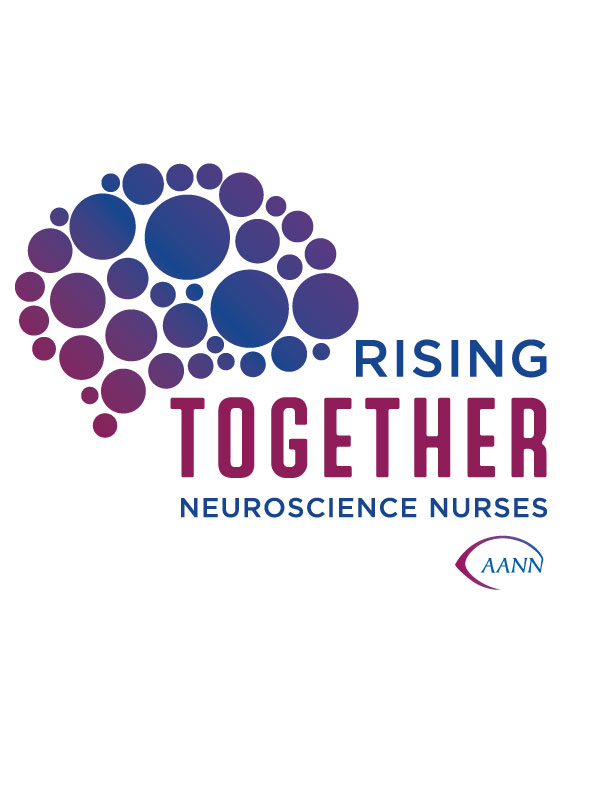
Challenging population
There are special challenges that come with treating such a wide variety of patients.“Depending on the diagnosis, a patient can be forgetful, aggressive, impulsive, or communication can be challenging,” said Sophia. “When speech is affected by the person's diagnosis, it can be exhausting.”
Hannah notes that neuroscience nurses must remember to be “extra patient and compassionate.” And a little bit of redirection for a confused or delirious patient goes a long way. “Sometimes it just means moving a patient closer to a window so they can see outside,” she said.
Neuroscience patients are also at significant risk for falls. “That has been a huge challenge,” said Sara “Thanks to leadership from our nurse manager Mary Speake, we have implemented several projects to reduce patient falls with injury. The unit has gone 18 months with no such falls. That's amazing!”
Rewarding work
While there are challenges working with these patients, it is also rewarding. “Seeing a patient with a life-altering stroke have a breakthrough in their recovery is the biggest joy for me,” said Sara. “For example, a patient who can only say one syllable when they first arrive is able to sing a song after months of therapy.”
Hannah also enjoys watching her patients make progress. “I love seeing the little steps patients make such as being able to stand for a couple of seconds after being bedbound or seeing people's moods change when their pain is managed well,” she said.
Collaborative care
Helping their patients make progress is a team effort. “We care for patients who are unable to walk, talk, and take care of themselves,” said Sophia. “With the assistance of our therapy teams – occupational, physical, and speech – and our nursing staff, we see recovery.” The nurses are also part of their patients’ teams. “I love getting to know our patients, their families, and being a part of their team,” said Sara.
Another joy of working as a neuroscience nurse is how the science of it keeps advancing, according to Sophia. “Treatment for strokes or brain tumors has come so far in the past 20 years,” she said. “I can't wait to see what advances we make over the next 20 years.” Hannah believes that because the nurses learn new things every day, it makes working on the unit continuously interesting.
Interested in the career?
For those who might be interested in neuroscience nursing, these seasoned professionals offer a little advice. “Neuroscience nurses must have a keen eye for any small neurological changes in their patients that are not baseline for them and be able to react fast,” said Hannah.
Being a team player is a key attribute for a good neuroscience nurse, according to Sophia. “Our unit would not be as functional as we are without every person here and their willingness to help,” she said. “This job can be exhausting mentally, physically, and emotionally. Having support from our manager, our ancillary staff, our Patient Care Supervisor Jenna Doyle, and even our housekeeping staff is such a vital component for a safer, more competent unit.”
Sara tells anyone interested in neuroscience nursing that flexibility and patience are key. “Working with patients who have neurological deficits can be a slow process,” she said. “Having the patience to work with people who may have difficulty communicating, understanding, or moving is essential.”
If you're interested in neuroscience nursing, there are volunteer opportunities at M Health Fairview to help you get exposure to the specialty. “Our volunteers are the best,” exclaimed Sara.
